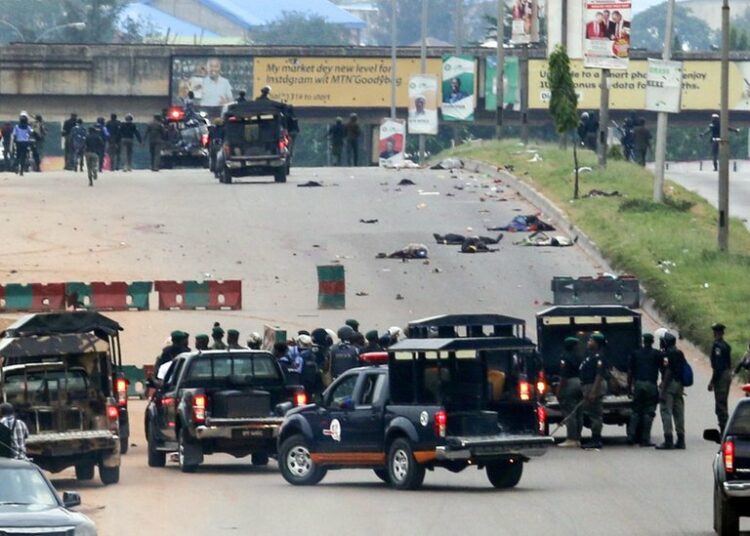Significant public outrage has trailed the killing of 16 Nigerian soldiers who were, reportedly, on a mission to make peace between two communities in Ughelli south local government area of Delta State.
The troops from the 181 Amphibious Battalion deployed in the Bomadi region, comprising the Commanding Officer, Lt Col A.H. Ali, two majors, a captain, and 12 soldiers, were said to have been responding to a conflict in the Okuama community when they met their untimely death on March 14, 2024.
Okuama and Okoloba are neighbouring communities with decades-long conflict over land and natural resources ownership that had remained unresolved. The unfortunate military men were said to have gone there due to escalating tension.
As a newspaper, we add our voices to those of all well-meaning Nigerians to absolutely deplore the gruesome killing of those gallant soldiers in such a mindless act of bloodletting. Like President Bola Ahmed Tinubu declared, the attack on the soldiers was an attack on the Nigerian state and it will not go unpunished. So, we totally align with the president in insisting that the culprit must be brought to book at all cost. We grieve and condole with the military and the families and friends who have lost their loved ones in this unfortunate episode,
However, we appeal for caution, tact, wisdom and learning from experience in executing the presidential mandate to bring the perpetrators to book. First and foremost, those who should suffer the full weight of the law and the power of the Nigerian state in this instance, as explicitly directed by President Tunubu, must be the culprits in the killings of the soldiers and not innocent villagers. The military and security agencies have a constitutional duty to protect the life and property of law-abiding citizens of Nigeria, including those living in Okuama in Delta State and adjoining villages.
Media reports have tended to show that the military has been carrying out indiscriminate executions of residents and arson attacks on houses in the affected communities in reprisal for the killing of its men. If that is true, then it is equally condemnable as the initial crime. The president’s backing should not be mistaken as a licence to indulge in wanton killing. From experience, most of those who bear the brunt of this method of justice are innocent persons. The perpetrators bolt away as soon as they commit the act, knowing what is coming.
It is noteworthy, in our view, that the Defence Headquarters (DHQ) has denied that it carried out reprisal attacks on Okuama. It claimed that, as a disciplined force, it complies with rules of engagement, laws of armed conflict and the respect for human rights even as it will be guided by law and not emotion in its search for the culprits. However, the disturbing videos of burning houses and dead bodies purportedly littering streets in the area need to be independently verified. As a newspaper, we are worried that troops reportedly denied journalists in the entourage of the state governor access to the community.
We urge a thorough enquiry into the entire episode of the military’s involvement in this communal conflict to the point that one of the groups saw it as a party in the conflict. As per the Nigerian constitution, the military is not the security agency saddled with the job of mediating in such matters. Also, the passions inflamed by the extremity of the killings should not becloud certain legitimate questions about strategy and planning of such a military operation. For instance, what was the intelligence available to the troops? What was the threat assessment? What was the backup plan? How were they picked apart in such a manner by non-state actors? Did the feuding communities consent to the peace mission or were the soldiers there at the behest of one party? Who authorised the mission and what was the terms of reference?
Though the president authorized the military to fish out the culprits; however, the security agencies that have that constitutional mandate are those under whose purview is internal security, like the Police force and the Directorate of the State Services (DSS). They have the requisite training, knowledge and experience to investigate the killings. The usual heavy-handed approach of the military has less chance of separating the wheat from the chaff, so to speak.
There are lessons to learn from incidents like this. In Odi, Bayelsa State 25 years ago on November 20, 1999, when some community members killed policemen and soldiers in the context of communal conflict, President Olusegun Obasanjo authorized military action. In the end, about 1,000 residents were killed. The perpetrators were never found. The community went to court and obtained judgment against the federal government to the tune of N37billion in 2013. The Jonathan administration paid N15 billion compensation after arbitration.
Again, in October 20 to 24, 2001, Nigerian soldiers were involved in the Zaki Ibiam massacre in which the about 200 unarmed Tiv men, women and children of Benue State were killed in a military operation following the killing and mutilation of 19 soldiers who had been deployed there to restore order due to clashes between Tiv and Jukun communities. Like in Odi, the avenging soldiers fired at anybody within sight. In the end, innocent people were the victims. Nobody was arrested, tried and jailed for the murder of Nigerian soldiers.
As a newspaper, we wish to say that Nigerians do not want a reenactment of the Odi and Zaki Ibiam massacres two decades ago. That kind of barbarity cannot come from a disciplined force in this modern age. The security forces must find the real culprits and prosecute them in accordance with the law.











